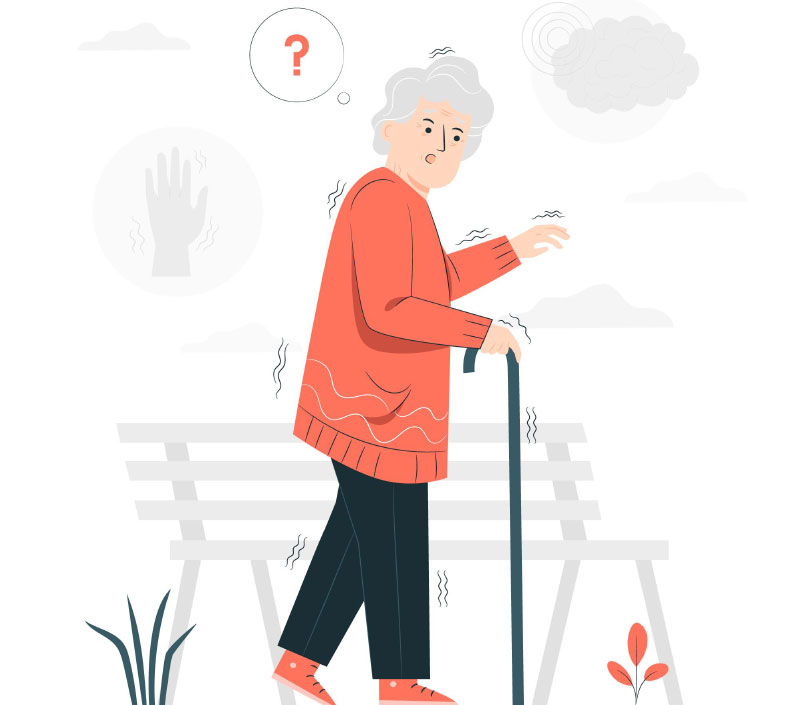Parkinson’s Disease Treatment in Mumbai
Parkinson’s Disease
Parkinson’s disease is a progressive neurological disorder that causes shaking, muscular stiffness, and tremors, making it difficult to carry out regular daily duties and maintain posture, balance, and coordination. The illness may also impair the patient’s capacity to communicate.
Although the prevalence of Parkinson’s disease is much lower in India, the problem should not be underestimated. The symptoms may be readily controlled with the proper care and treatment.
Causes:
Our brain contains chemicals known as neurotransmitters, which transmit messages to various parts of the body to regulate functions and movements. In a specific brain region called the substantia nigra, an essential neurotransmitter called dopamine is produced.
Parkinson’s symptoms start to appear when approximately 70-80% of the dopamine-producing cells are lost.
👉🏻 Here are some key points to keep in mind about Parkinson’s disease:
- Although there is currently no cure for Parkinson’s, its symptoms can be effectively managed. Significant research is ongoing to discover a cure.
- Parkinson’s is a life-altering condition but not life-threatening, meaning it does not cause death directly.
- The progression of Parkinson’s is gradual and varies greatly among individuals, making it difficult to predict the rate of progression, severity, and types of symptoms.
- Managing Parkinson’s symptoms and maintaining quality of life can be achieved through medications, exercise, a healthy lifestyle, and supportive therapies, allowing for independent and productive living.
- Regular doctor visits are crucial as the condition progresses to monitor symptoms and make timely adjustments to medications.
- Parkinson’s can affect not only the elderly but also individuals between the ages of 21 and 40 (known as Early Onset Parkinson’s) and those under 20 (Juvenile Parkinson’s).
- Parkinson’s that begins before the age of 50 is referred to as Young Onset Parkinson’s.
Symptoms:
During the early stages of Parkinson’s disease, the patient may not have any noticeable symptoms, just little tremors that go undetected. Symptoms often begin in one section of the body and spread across the body over time.
The following are some of the most common symptoms of Parkinson’s disease:
- Mild tremors that generally begin in the limbs and worsen over time
- Bradykinesia, or slow movement, makes it difficult to execute activities.
- Muscle stiffness that limits the range of motion
- Abnormalities in balance and posture are visible.
- Involuntary actions such as blinking and smiling are lost.
- Inability to communicate fluently
Handwriting change
Stages:
This section is a guide to help you live a better, healthier and productive life with Parkinson’s.
Early Stage: There may be a mild tremor and other movement-related symptoms on one side of the body, along with slight changes in speech, posture, and walking. Additionally, individuals may experience depression, slower thinking, and a loss of smell.
Middle Stage: As Parkinson’s disease progresses, symptoms may become more severe, impacting balance, walking patterns, and speech quality. This can interfere with daily activities such as eating, dressing, and writing.
You might experience more frequent memory lapses, difficulties with multitasking, and challenges in organizing, planning, and scheduling. Additionally, symptoms may include anxiety, hallucinations, fluctuations in “on-off” periods, fatigue, and impulse-control disorders.
Advanced Stage: Not everyone with Parkinson’s disease reaches the advanced stage. Some people with Parkinson’s (PwPs) may stay in one stage for years. However, for some, symptoms may progress over time, becoming more severe and less responsive to medication. Issues such as poor balance, difficulty walking, and fear of falling may limit your ability to leave the house or bed without assistance.
Significant cognitive decline, including personality changes and dementia, may also occur. Assistance with routine activities like dressing, eating, and bathing may be necessary. During these times, frustration and impatience can arise for both you and your caregivers, but it’s crucial to stay calm, focus on what you can still do, and keep trying.
Treatment:
- Comprehensive variety of pharmacological and surgical solutions for Parkinson’s disease care, with the goal of increasing the patient’s quality of life. Medication and surgical procedures are examples of this.
- The medications assist to alleviate symptoms and raise dopamine levels to a healthy level. Carbidopa-levodopa, dopamine agonists, MAO B inhibitors, anticholinergics, and amantadine are used.
- Deep brain stimulation, or DBS, is one kind of surgical intervention. This procedure involves implanting particular electrodes in certain areas of the brain, which are linked to a small impulse generator inserted under the skin in your chest through a thin line. The device aids in the generation of impulses that are transmitted to the brain in order to manage the symptoms. It is often prescribed for people with advanced Parkinson’s disease.
For more information & consultation on Parkinson’s Disease Treatment in Mumbai Call our expert Dr. Amit Shah – Consultant Neurologist in Mumbai on 9819561456 or Book an Appointment

